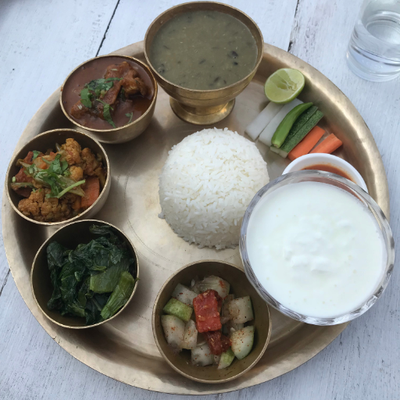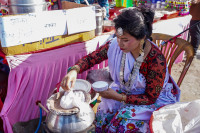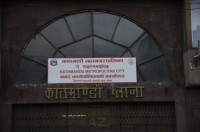Food
Thamel’s Bismillah Halal is tiny and without frills, but its meat asserts its authority
Despite being located in Thamel, the Bismillah Halal Restaurant is an escape from chaotic Kathmandu—it transports you to a world of its own.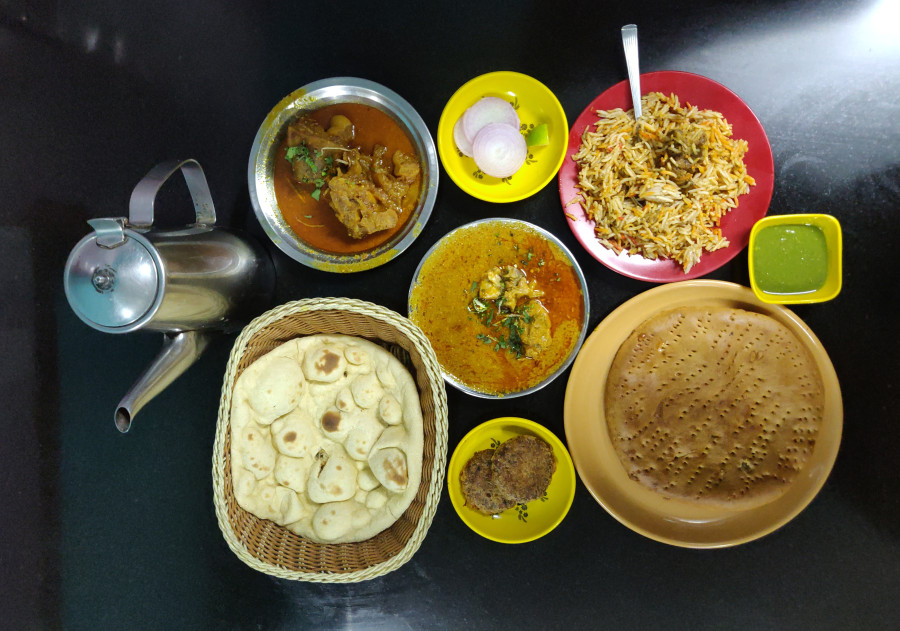
Hantakali
Old bearded men wearing topis and breezy salwar kameez sit in a broad circle on plastic chairs, between younger men in t-shirts and jeans. Under makeshift tarpaulins covering a small courtyard, it is quiet. Besides a couple of butchers waiting to sell the remnants of dangling mutton carcasses, and one small general store, everything is closed for the night—except for the Bismillah Halal Restaurant. It is 8pm and a night stroll into Muslim tole, on the north-eastern edge of Thamel, is a peaceful procession into a distinctly unique setting.
Bismillah is one of just a few dedicated halal restaurants in the area, and has thus been a popular haunt for the Muslim community for about 20 years. It serves the usual suspects: biryani, mutton in many forms, roti and, of course, the kebab. It draws on influences from around the Islamic world for its dishes, like the shami kebab, firnee and bheja fry.
As the men outside continue conversing quietly, perhaps digesting their iftar, just a couple of metres away, there is the flap, smack and roll of rotis being readied for the tandoor. It’s the middle of the month of Ramadan so Bismillah is busier than usual. Men stand in the restaurant’s doorway, picking up dinner to take away, while the four tables inside are full of more men scarfing down their nightly meal.
While a tandoor welcomes visitors to this shoebox restaurant, the owner sits behind a swathe of clay-red chicken pieces ready for the mud oven, tranches of yellow bread and aloo chop and a mound of pakoda. At the end of the till, gulab jamun (lal mohan) float in a deep, viscous reservoir of syrup.
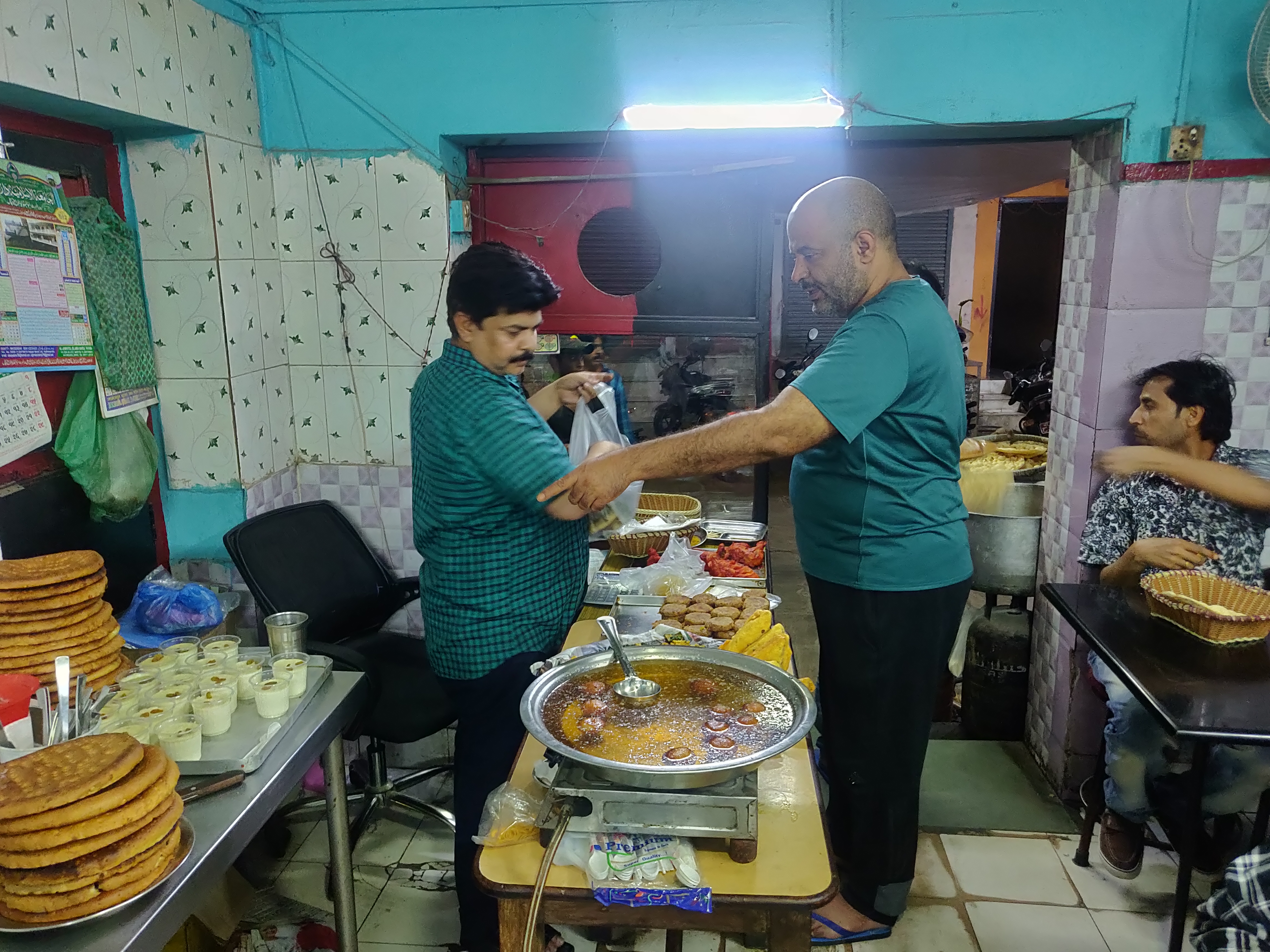
The wall-tacked menu is resoundingly meaty, with just a couple of vegetarian options, focusing more on chicken, buff and mutton. The popularity of the biryani is rather unsurprising, but the much-anticipated dish of buff bheja—brains—is unfortunately not available. Neither is the rumali roti.
The clientele is diverse—some speak English, others Hindi and Indian dialects, while the staff take orders in Nepali. Most sit quietly, hardly speaking, between handfuls of biryani, meat and bread. It’s the second meal of the day for many of these men, who have fasted until darkness hit the city, and this part of Thamel is where some of the only halal restaurants in Kathmandu can be found.
The first plate to grace the table is the buff paya, a messy dish of buffalo feet. The man behind the till points to one man in the corner fervently stuffing fistfuls of connective tissue into his mouth. It is almost certainly the hock of the beast, for it is a gelatinous mess of tendons, sinew and bones.
The chunks of what actually seem to be hooves bestow a muddy sheen to the soupy liquid, which shellacs the fingers and lacquers the lips. The thin soup’s spices are relatively restrained, but offer a small whisper of unexpected heat. With a fatty film developing on top, the genteel masala lets the buff foot the flavour bill. It pays generously.
Ignoring how the greasy wobble on the lips might manifest later, almost definitely as an added wobble on the hips, disjointing and cleaning each bit of bone is a joy— no matter how ungainly it looks. This should be every dieter’s Achilles heel. The marrow one can muster from each boney morsel is a delight, and slivers of garlic and ginger provide occasional flourishes to the glossy dish. Being able to render these joints into an edible state, and the subsequent depth of the buff in this dish, is irrefutable evidence of the hours it took to cook.
Chicken korma follows the buff paya, and does its best to steal the show with its pronounced masala. The thicker gravy is reminiscent of the paya, but its spices don’t overpower its yoghurt base, instead delivering more piquancy. A distinct muskiness permeated this dish, and the culprit is surely the whole cloves and the occasional zesty strands of ginger. The chicken is cooked perfectly, and is far meatier than the typically bone-based curries you can find around the Capital. The thicker, spicier gravy is perfectly mopped up with wads of sheermal roti.
Frisbees of this sweet roti sit in stacks behind the till, waiting to be thrown to customers, having already been cooked in the tandoor. The thicker, leavened bread is the perfect vessel for the heavy korma, and a great sponge for the paya. Its sweetness adds an entirely new dimension to the curries. The bread on its own, however, is equally interesting. The outer rims are almost biscuity, while the inside is akin to sweet brioche, and the bread’s browner sheen infers the addition of milk.
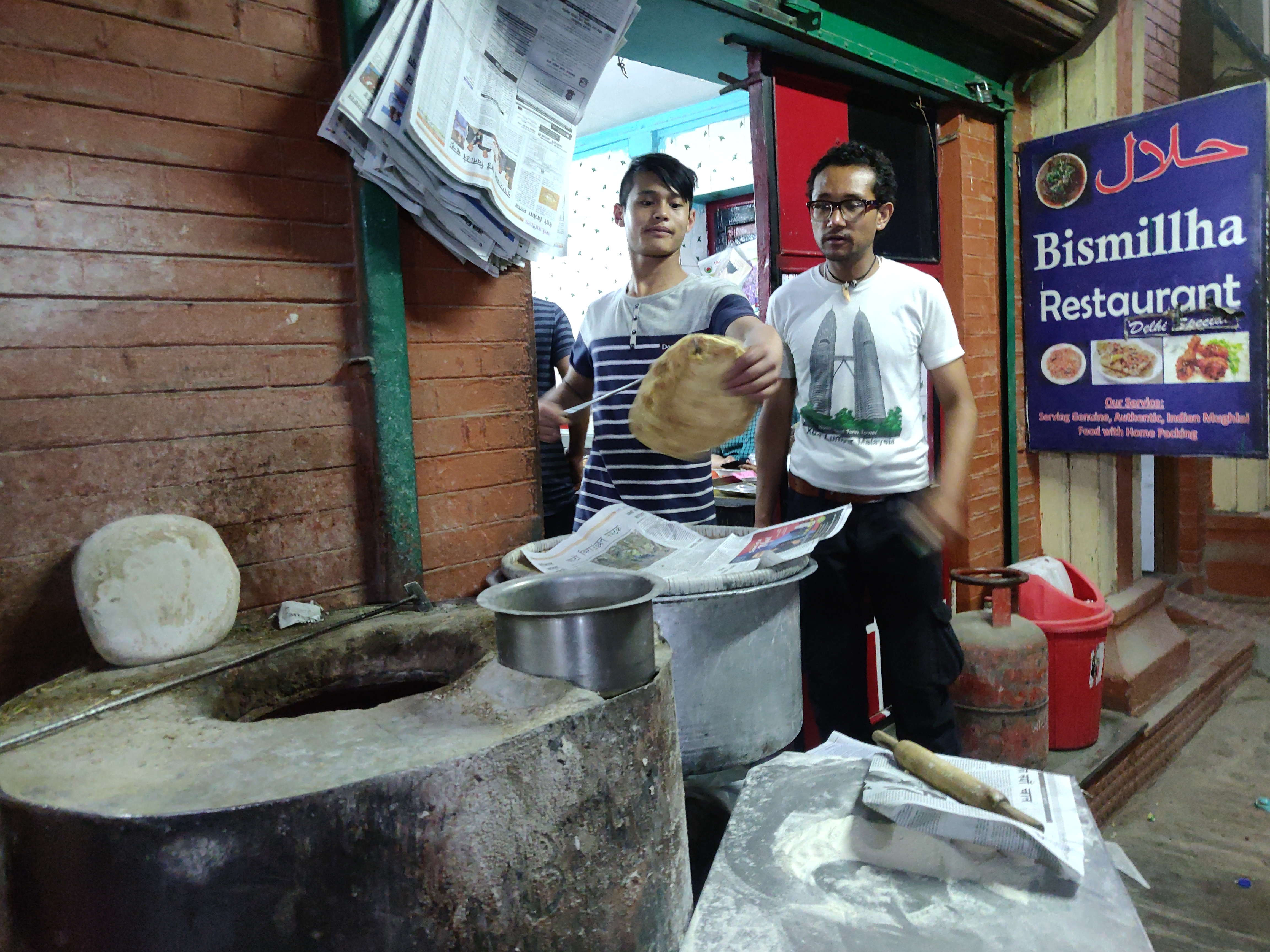
Filled with watermelon seeds, and with touches of sweetness and indescribable spices, the bread is an interesting combination. Apparently brought from Iran to North India during the Mughal empire, it has several iterations, but most notably includes saffron. This spice might not make an appearance at Bismillah, but sheermal is the best bread offer. The tandoori roti, on the other hand, is reheated, rather than fresh, which makes it more of a tasteless, bubbly cracker.
On the opposite end of the textural spectrum are the shami kebabs—pre-seared pâté-like patties of meat pounded past the point of keema. While well-seasoned and cooked to a silky medium, the patties put meat front and centre. Served tepid, the meaty bites provide a semblance of respite from the korma’s spice and a point of difference from other North Indian joints around the city.
Finally, following confusion between the small staff running the place, out comes the mutton biryani. In a half portion, like the rest of the plates previously ordered, the serving is somewhat generous. While there is a singular piece of impressively tender mutton, the bulk of the biryani is disappointing. The orange-tinted rice is clearly reheated, resurrected in a kadai prior to serving, for the grains are swollen and fat, and coat the mouth with salt. The utilitarian plate of rice and a chunk of meat is the most disappointing part of the offering, but coming to Bismillah expecting frill, fancy or refinement would be remiss. Despite the biryani being a resounding disappointment, the rest of the meal was perfectly spiced and very reasonably priced.
With the weight of the meaty exploits of the meal burdening one’s soul, the quiet courtyard-like area outside the restaurant doesn’t abuse diners leaving the area with loud music and bright lights. Away from Thamel’s nightly depravity, as the butchers sell their final legs of mutton, Bismillah is still plying its wares to a thinning crowd. The old men are still perched in a circle and they continue chatting, perhaps digesting their iftar into the night.
Bismillah Halal Restaurant: (Rs. 70-500)
Food: ★★★★
Ambience: ★★
Value: ★★★




 21.12°C Kathmandu
21.12°C Kathmandu